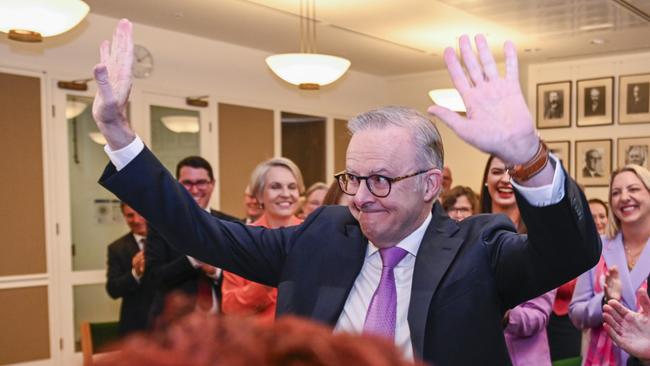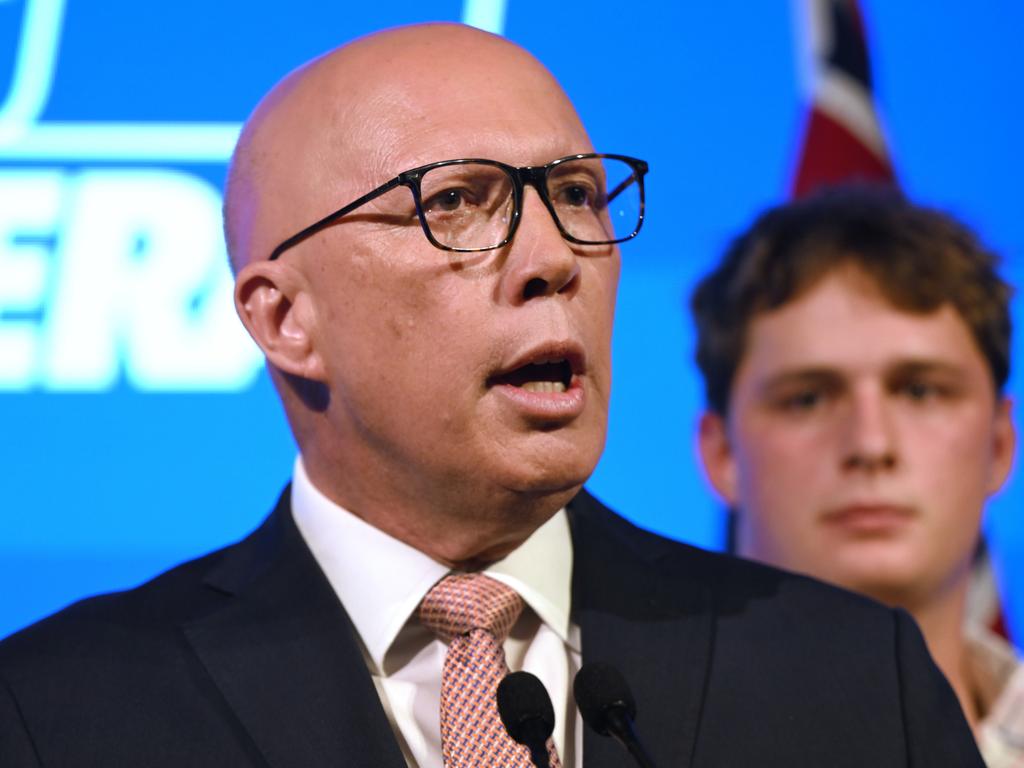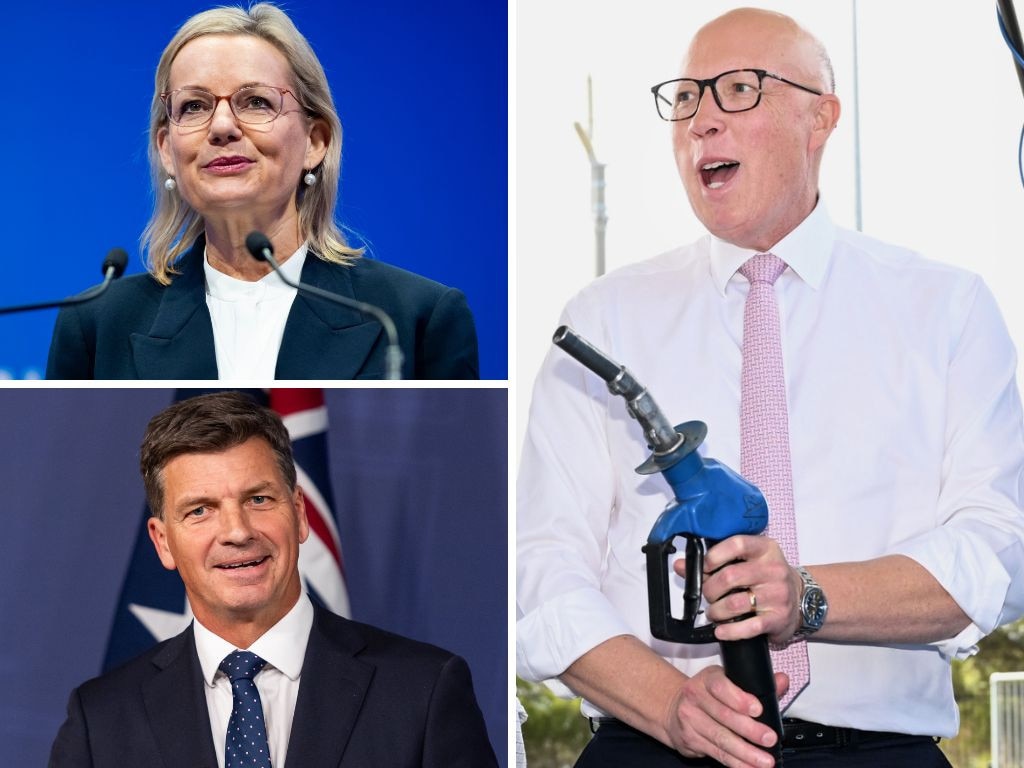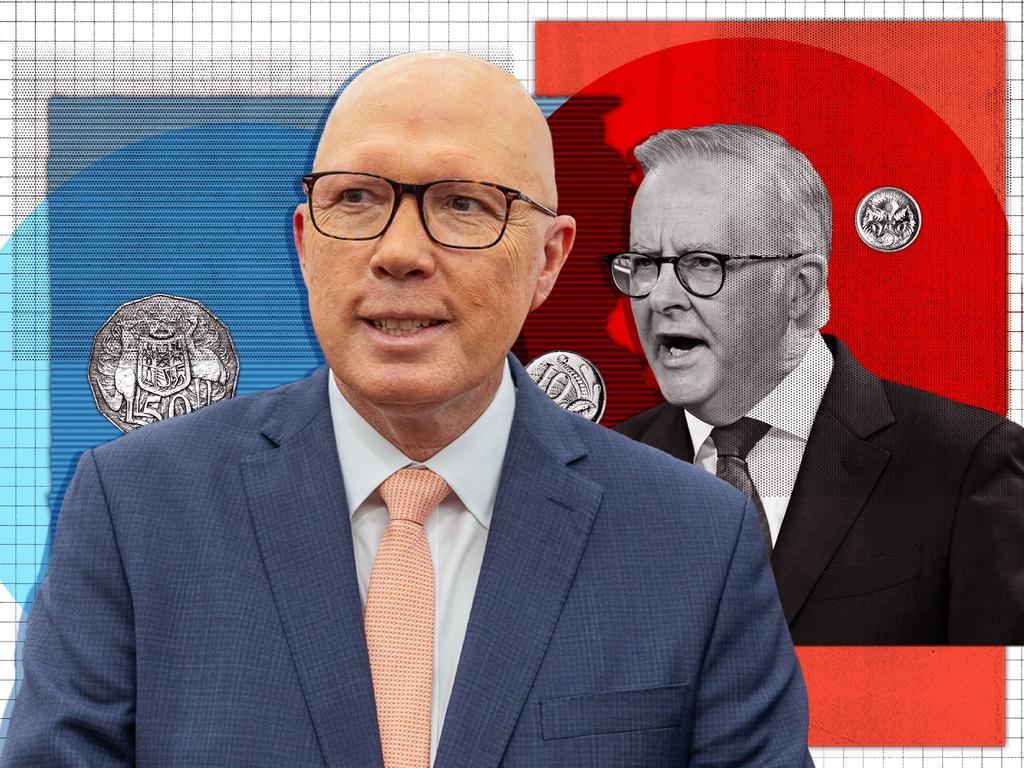Humiliation must send Liberals back to first principles
Australia currently lacks a community-based centre-right party focused on small government, personal responsibility and free enterprise. The Liberal Party has drifted away from its core mission – and is paying the price.

In practice, our elections are a zero-sum game. No matter how unattractive the options, there must be a winner and a loser.
So even with what looked like a nil-all draw, with roughly a third of votes respectively cast for Labor, the Coalition and the minor parties, Labor won a decisive and historic victory. The Coalition is in disarray and needs a root-and-branch rethink.

Before it talks personnel, policies, organisation and tactics, the Liberals need to revisit first principles and reconnect with their raison d’etre.
This is the way to adapt Peter Dutton’s election slogan and get the Liberal Party back on track.
As it did before Robert Menzies, Australia currently lacks a community-based centre-right party focused on small government, personal responsibility and free enterprise. The Liberal Party has drifted away from its core mission and is paying the price.

The party’s electoral humiliation will see its lower house MPs outnumbered two to one by Labor. The Liberals must seize this blow as a blessing in disguise – without the expectation of storming back into power at the next election, they can engage in a fundamental realignment to put themselves into good fighting order.
Unimaginably, an outfit whose founder famously hitched his movement to the fortunes of “the forgotten people” has gradually forgotten the forgotten people. The Liberals must return to their roots because while issues, methods of communication and social norms have changed dramatically across the past 80 years, the principles espoused by Menzies remain a guiding star for national and social advancement.
Here is how Menzies described the small businesspeople, salaried workers and what we now call working families who made up his forgotten people: “They are for the most part unorganised and unselfconscious. They are envied by those whose social benefits are largely obtained by taxing them. They are not rich enough to have individual power. They are taken for granted by each political party in turn. They are not sufficiently lacking in individualism to be organised for what in these days we call ‘pressure politics’. And yet, as I have said, they are the backbone of the nation.”
They still are – and the Liberal Party has forgotten how to devise polices for them and communicate with them. It has fallen into the trap of appealing to their hip pocket rather than their good sense.
Liberals need to help mainstream voters readjust their demands. The inexorable growth of government in recent decades has created a population only too happy to put their hands out for largesse and too often inclined to look for government solutions to every problem.
The Liberals have not resisted this drift strongly enough; indeed, they have accelerated it. This conflicts with the first line of their foundational “We Believe” statement that commits to “lean government that minimises interference in our daily lives and maximises individual and private sector initiative”.
Government funding and services are available to Australians from before conception to beyond the grave. In the decades between IVF funding and a widow/er pension, public funding supports not only those in dire need but most people when it comes to childcare and preschool, university and TAFE training, or housing needs and electricity rebates.
Governments state and federal will subsidise your solar panels and help you purchase a battery. They will cut your student loan, offer you a sports voucher or send you to an arts workshop.
Government will give you paid maternity leave and even send out vouchers for meals and holidays. Government advertising tells us how to respect women, deal with sexual consent and understand primary healthcare.
Government reduced tariffs and opened industries to global competition but now subsidises renewables to reduce emissions, undermining our cheap energy advantage. The unnecessarily inflated electricity prices then act like an internal tariff so that our industries cop it from both sides – government as national self-harm.
Many citizens who struggle to support themselves in other ways know their way around government entitlements like politicians know their way around the Qantas Chairman’s Lounge. And at every election the major parties conjure up new giveaways on borrowed funds. (Yes, they plunge us deeper into debt to give us additional freebies.)
Labor is taking $16bn of debt from the shoulders of students to make it a shared burden for all taxpayers, many of whom will never earn as much as those students. It was a Labor electoral bribe that we all pay for and many applaud.
The Liberals, by comparison, offered a temporary cut in petrol tax and additional income tax rebates, putting the budget further into debt for at least two years. This is unsustainable; our budget will collapse under its own weight.
The Liberals are supposed to guard against this fiscal recklessness.
The people who will suffer most are not the big end of town, or the poorest workers who are net welfare recipients. Mainstream citizens will carry the load, trying to do more with less and being burdened by increasing levels of taxation while others drop out of taxpaying ranks.
As Menzies said three-quarters of a century ago, too many of us have been “busy getting ourselves on to the list of beneficiaries and removing ourselves from the list of contributors” so we could thrive on “somebody else’s wealth and somebody else’s effort”. The Coalition parties need to stand for aspirational families, small businesspeople and all those who believe in individual freedom, self-reliance and free enterprise.
From opposition the Coalition failed to oppose Gonski funding, accepting the reach of Canberra into every school in the country. It also failed to oppose the National Disability Insurance Scheme even though it knew rorting and over-servicing would follow.
When it had the chance in government, the Coalition failed to privatise or pare back the National Broadband Network, an unnecessary federal communications bureaucracy.
Neither did it reform, constrain or merge the public broadcasters, the ABC and SBS.
During the pandemic the Coalition delivered the largest peacetime expansion of government expenditure and control. And while a significant response was warranted, the overreach still hurts us economically and by way of public expectations.
The abandonment of small-government principles has gathered pace for more than a decade. It is not just a factor of the Dutton opposition and this election cycle.
Dutton did a reasonable job trying to bring his party back to the fundamentals by backing the only energy source that could deliver net zero with affordable and reliable power. But his nuclear plan involved public ownership of the reactors, which conflicted with Liberal principles.

The opposition also promised to repeal income tax cuts legislated by Labor – in other words, it promised higher taxes while offering tax giveaways of its own, including a temporary 25c a litre reduction in fuel excise and a $1200 rebate for some.
This was as confusing as it was fiscally paradoxical, and it meant the Coalition promised deeper deficits than Labor for the next two years.
The Liberals’ achilles heel for two decades has been climate and energy policy. They have succeeded when they have stood firmly on the side of reliable and affordable energy, and failed when they have tried to match Labor’s climate evangelism.
There are two options: remain committed to net zero and improve the nuclear plan because it is the only engineering mix that can get there; or boldly step away from net zero and prioritise electricity price and supply, promising to reduce emissions when and where we can, in line with global trends rather than ahead of them.






To join the conversation, please log in. Don't have an account? Register
Join the conversation, you are commenting as Logout